Key takeaways:
- Emotional support varies between individuals; understanding personal experiences can enhance the way we support others.
- Building a strong support network focuses on quality relationships and open communication to foster trust and understanding.
- Utilizing professional resources, such as therapy and support groups, can provide valuable insights and validation in navigating emotional challenges.
- Regularly evaluating support methods helps identify what is effective, allowing for adjustments that contribute positively to emotional well-being.
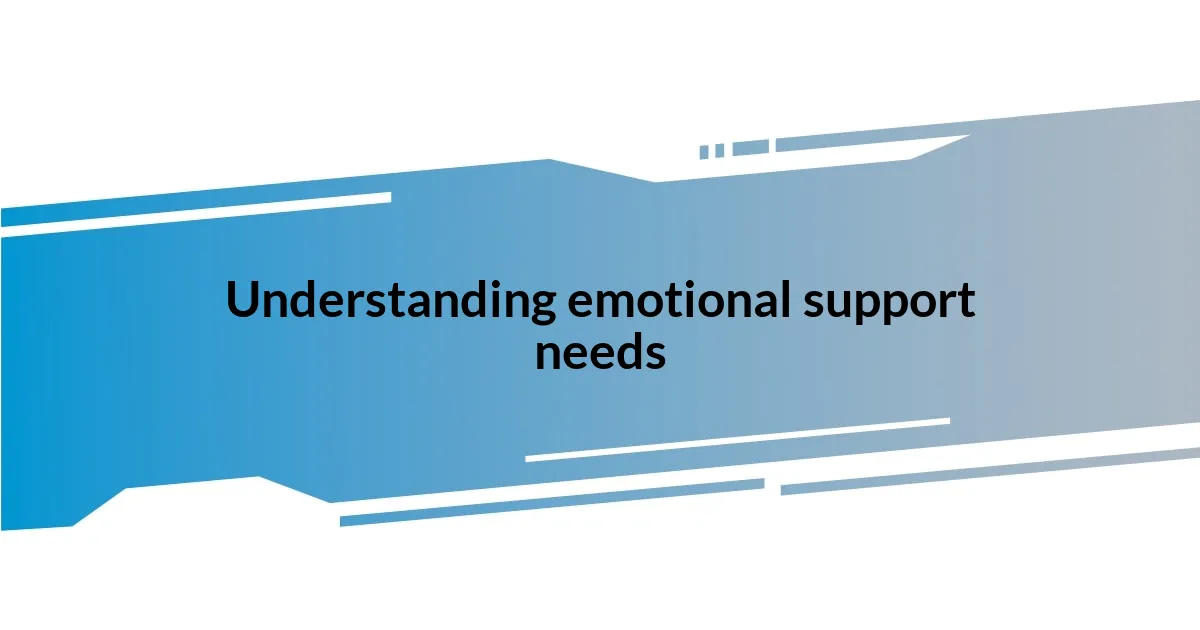
Understanding emotional support needs
Understanding emotional support needs varies significantly from one person to another. I often reflect on my own experiences with emotional support – there are times when simply being present with a friend means everything. Have you ever felt that comforting silence, where words aren’t necessary but understanding flows between you?
I’ve also noticed that emotional support can manifest in different ways; for me, it shines through validation. When a close friend acknowledges my feelings, it creates a safe space for me to open up. Isn’t it intriguing how a simple “I see you” or “You’re not alone” can provide immense relief?
Additionally, some people find strength in practical help or advice, while others gravitate toward empathy and active listening. I remember a time when I desperately needed guidance during a tough career transition, and a mentor’s insights were invaluable. In moments like that, what kind of support resonates most with you? Understanding these nuances can help each of us provide better support to those around us.
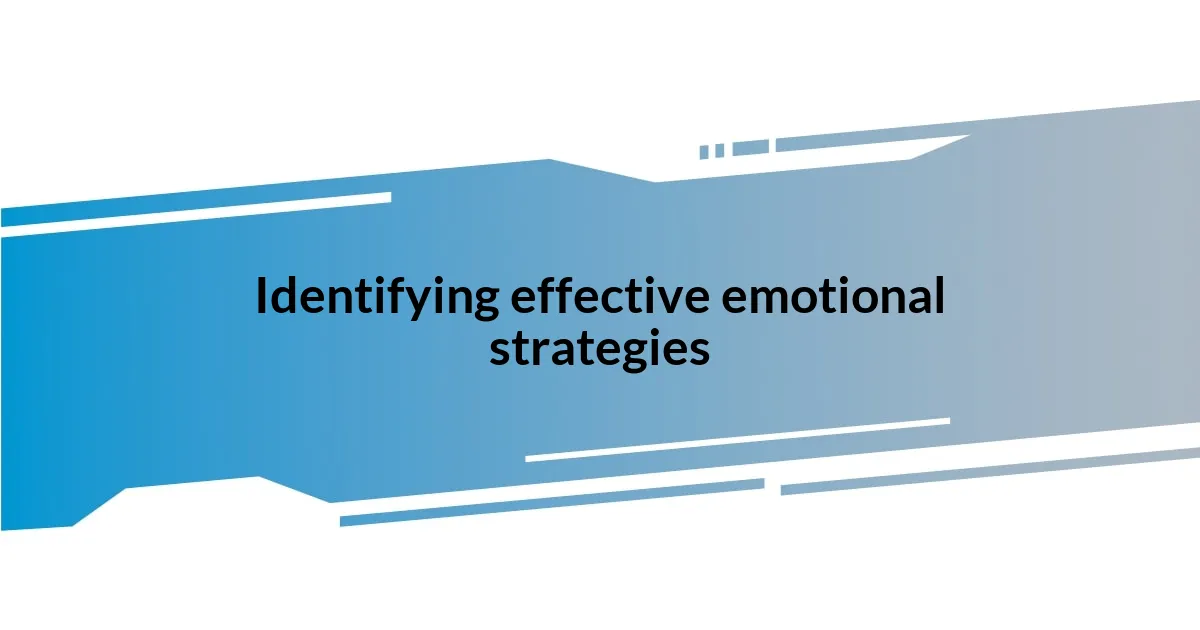
Identifying effective emotional strategies
Identifying effective emotional strategies involves recognizing what resonates with you and those you support. I’ve found that keeping a journal can be incredibly helpful. The simple act of writing down my thoughts often clarifies my feelings and gives me a fresh perspective on challenges I face. Sometimes, just the process of expressing myself on paper transforms heavy emotions into something manageable.
Here are some strategies that can be beneficial:
- Active Listening: Just being there to listen without jumping to offer solutions.
- Mindfulness Practices: Engaging in meditation or deep-breathing techniques to help center thoughts.
- Physical Activity: I often turn to a walk or some light exercise to release pent-up feelings.
- Connecting with Nature: Spending time outdoors can provide a grounding experience, bringing clarity.
- Finding Community: I cherish the moments spent in supportive groups where shared experiences create a sense of belonging.
Each of these strategies has its own merits, and it’s worth experimenting to see what works for you and your loved ones.
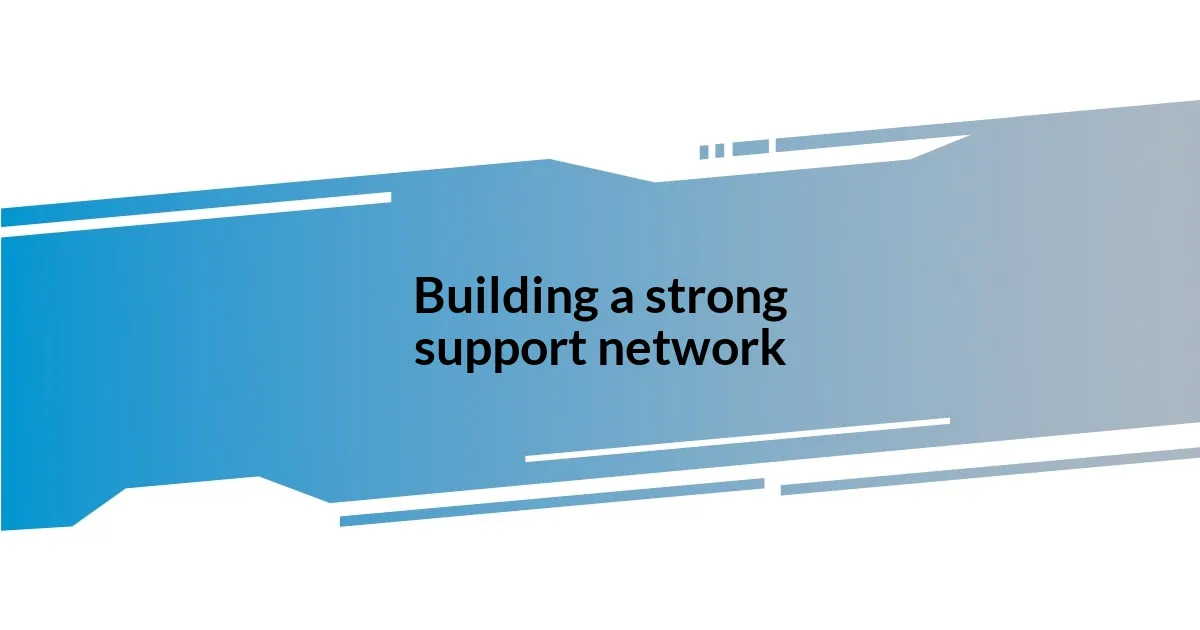
Building a strong support network
Building a strong support network is essential for our emotional well-being. In my journey, I’ve learned that the quality of relationships matters more than the quantity. For instance, I remember when I started nurturing deeper connections. I reached out to a few trusted friends, sharing experiences that mattered most to me. In return, I found they’ve opened up too, igniting a sense of community that helped us all. Have you ever experienced that moment when a friend truly gets you? Exhaustive lists of acquaintances can feel empty compared to one understanding soul in your corner.
I’ve often reflected on how actively engaging with my support network can deepen those connections. Attending regular catch-ups or even setting up virtual hangouts creates consistency. I recall a time when a simple weekly coffee chat transformed a flat relationship into a solid friendship. Besides, having diverse perspectives in my circle—some friends are incredible listeners, while others challenge me to think differently—has been invaluable. It’s remarkable how this blend of support can enrich my emotional landscape.
Another key aspect of building a strong network is maintaining open communication. I find that sharing not just my highs but also my lows fosters trust. For instance, there was a period when I faced significant challenges at work. By talking openly about my fears and uncertainties, I discovered that many of my friends had faced similar struggles. This exchange didn’t just strengthen our bonds; it also created a safe space where we could support each other. How can we truly grow without leaning on those we trust?
| Type of Support | Benefits |
|---|---|
| Emotional | Provides empathy and understanding, allowing for vulnerability. |
| Practical | Offers tangible assistance with daily tasks, alleviating stress. |
| Social | Fosters a sense of belonging and reduces feelings of isolation. |
| Challenging | Encourages personal growth by exposing us to new perspectives. |
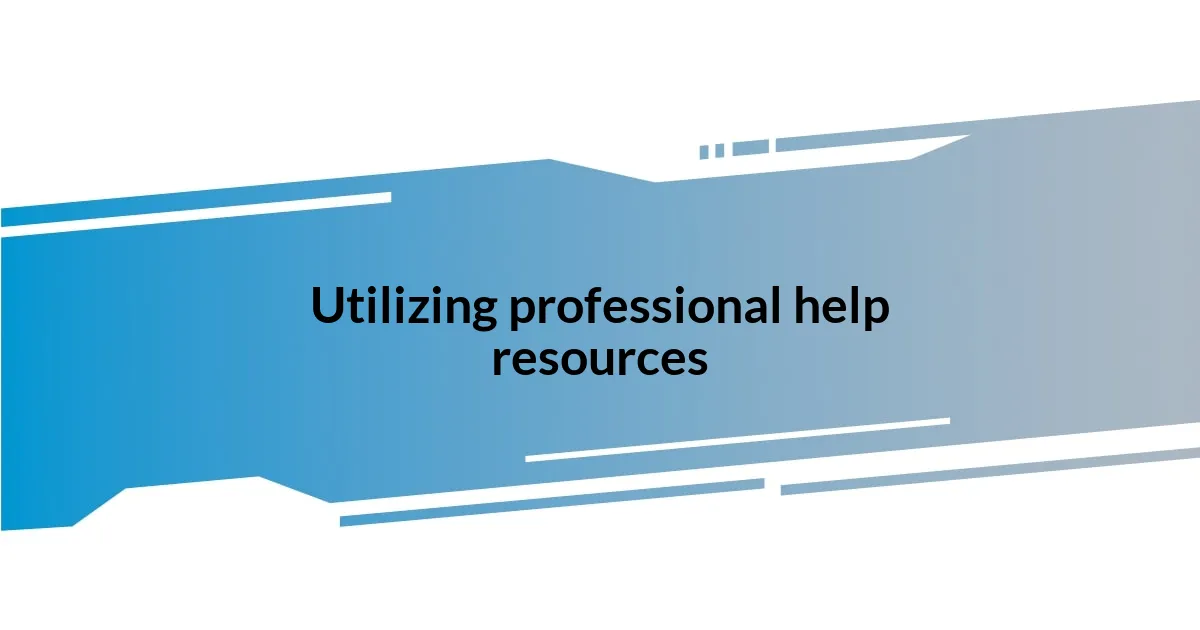
Utilizing professional help resources
Utilizing professional help resources can be a game-changer in navigating emotional challenges. I’ve experienced that seeking therapy initially felt daunting, but the clarity and tools I gained were invaluable. Have you ever felt overwhelmed by emotions and wished for expert guidance? I remember my first session vividly; it was like finally having a map in a vast, confusing landscape. The therapist helped me identify patterns in my thoughts that I hadn’t noticed before, which was eye-opening.
Moreover, I’ve found that exploring workshops and support groups can complement traditional therapy. For instance, I attended a group focused on anxiety management, and it was refreshing to hear others voice similar struggles. The shared stories fostered a sense of validation, making me realize I wasn’t alone. Have you considered how community can amplify personal growth? It’s incredibly powerful to interact with professionals and peers who understand your journey.
Even utilizing apps designed for mental well-being has made a difference for me. There are times when I just need a quick guided meditation or a reminder to check in with myself. Once, during a particularly stressful week, I turned to an app that offered daily prompts, prompting me to reflect and breathe. That small shift made a world of difference, allowing me to approach my challenges with a more balanced mindset. Isn’t it amazing how technology can support emotional growth?
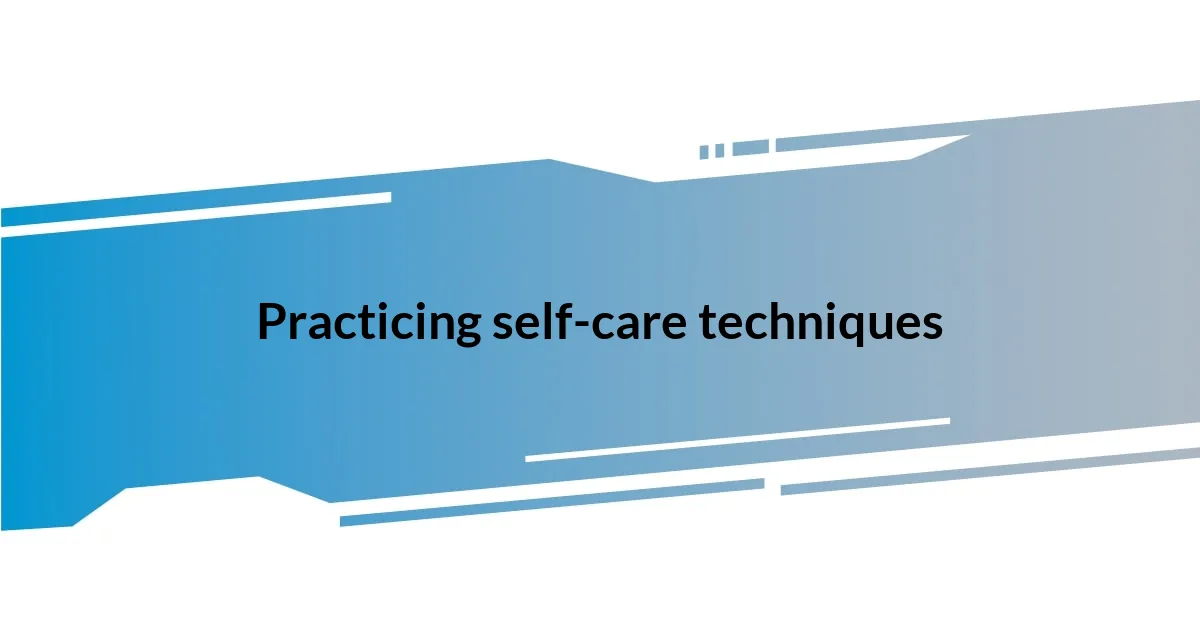
Practicing self-care techniques
Practicing self-care techniques has been crucial for my emotional health. I’ve discovered that something as simple as setting aside time for quiet reflection can redefine my day. Whenever I’m feeling overwhelmed, I find a cozy corner in my home and allow myself to just be—sometimes with a journal, sometimes without a word. Does that space create a pressure relief for anyone else?
Mindfulness has truly been a game changer for me. One afternoon, after a particularly stressful week, I took a short walk in a nearby park and focused solely on my surroundings. The crunch of leaves beneath my feet and the gentle whisper of the breeze grounded me in the moment. It’s fascinating how reconnecting with nature can have such a profound impact on our emotional state. I often wonder why we underestimate the beauty of these simple moments.
Another technique that I have incorporated into my routine is engaging in creative activities. There’s something deeply therapeutic about allowing myself to paint or try out a new recipe. I vividly remember an evening spent mixing vibrant colors on canvas; it felt like a release. Creativity isn’t just about the final piece, but about the joy and freedom it brings during the process. Have you ever found that pouring your feelings into creative outlets brings clarity? It’s these small acts of self-care that weave a resilient fabric of emotional support in our lives.
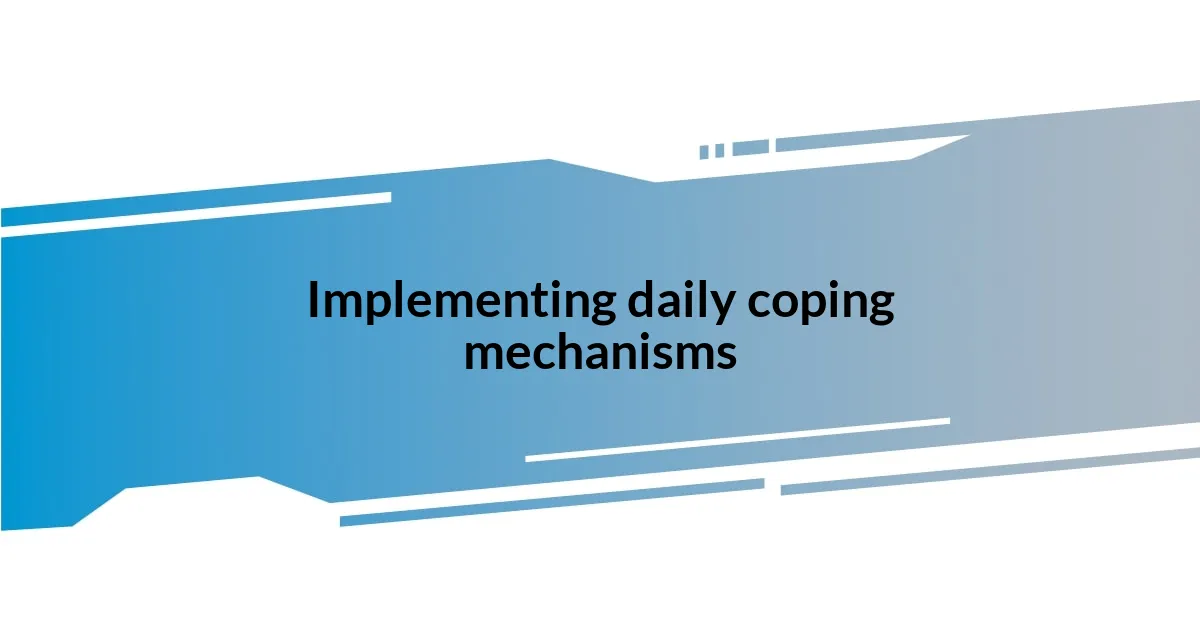
Implementing daily coping mechanisms
Implementing daily coping mechanisms has become a cornerstone in my quest for emotional stability. One method that I’ve found particularly effective is the practice of gratitude journaling every morning. As I jot down three things I’m thankful for, I notice how it shifts my mindset, transforming a potentially negative start into a positive one. Have you ever tried to list your blessings? It’s remarkable how a simple act can cultivate appreciation and lighten the load of daily stress.
I also make it a point to schedule small breaks throughout my day. During these moments, I step away from work, even if just for five minutes, to stretch or do some deep breathing exercises. I remember one day feeling suffocated by deadlines, and taking that break allowed me to regain focus and clarity. How do you recharge during the day? These brief pauses help me create a buffer against overwhelm, letting me return to my tasks with renewed energy.
Another coping strategy I’ve embraced is engaging in physical activity, even if it’s just a short dance session in my living room. It might sound trivial, but those few minutes of moving to my favorite songs lift my spirits immensely. I’ve realized that shaking off tension through movement doesn’t just brighten my mood; it also releases pent-up emotions in a way that words sometimes can’t. Isn’t it fascinating how our bodies can help process feelings when we let them?
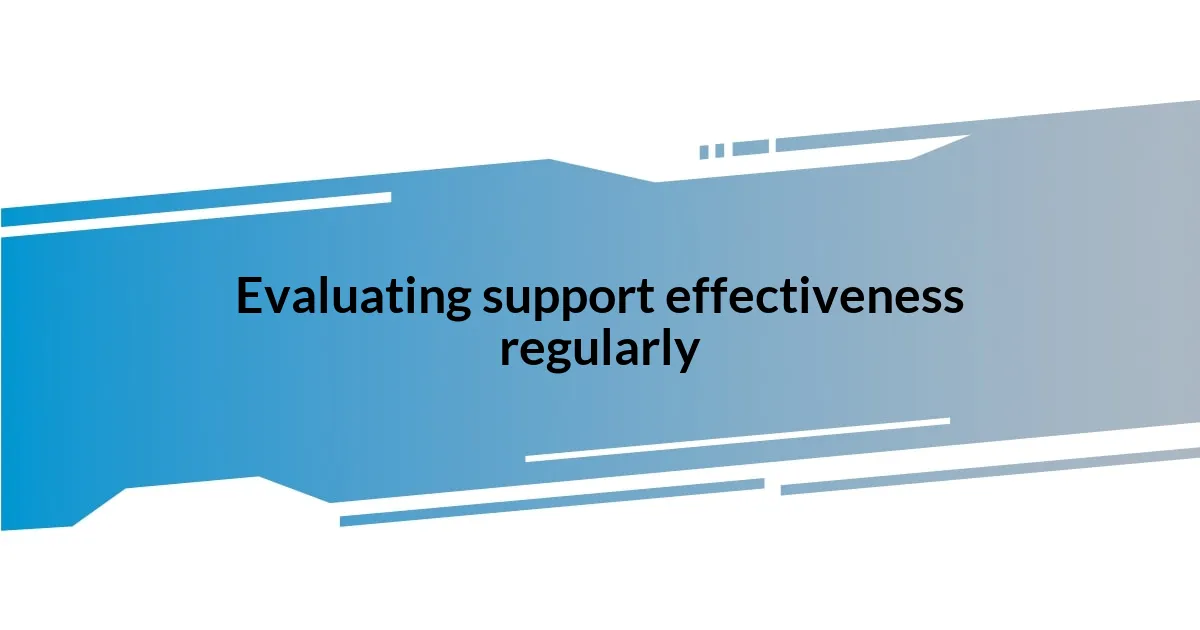
Evaluating support effectiveness regularly
Evaluating the effectiveness of my emotional support methods has been an eye-opening practice. I often take a moment at the end of each week to reflect on what strategies truly helped me. For instance, there was a time when I relied heavily on online forums for support, but after a couple of months, I realized they didn’t resonate as deeply as I hoped. Have you ever found that some sources of support feel helpful one day and less effective the next?
Tracking my feelings and experiences has played a key role in this evaluation process. I keep a simple log where I note what I did for self-care and how I felt afterward. One week, I was surprised to see that listening to music had a significantly positive impact on my mood, while some of my usual go-to activities didn’t seem to give me the boost I needed. Isn’t it intriguing how our emotional landscapes can shift so quickly?
Checking in on my support methods ensures that I’m not just going through the motions. I like to ask myself questions like, “Am I still benefiting from this activity?” or “How does this support make me feel today?” One time, I let a habit linger out of obligation, but once I evaluated its impact, I realized I needed to let it go. The freedom of that decision was refreshing, illustrating how crucial regular evaluation is for my emotional well-being. Have you given yourself the chance to reassess what truly serves you?